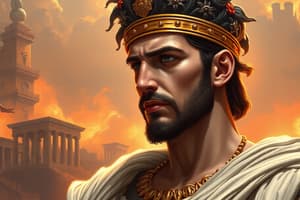Podcast
Questions and Answers
What nickname did Caligula earn during his childhood?
What nickname did Caligula earn during his childhood?
- Little Boot (correct)
- The Mad Emperor
- Little Caesar
- Divine Ruler
Which of the following actions characterized Caligula's early reign as emperor?
Which of the following actions characterized Caligula's early reign as emperor?
- Abolished certain taxes and promoted public works (correct)
- Engaged in extensive foreign military campaigns
- Increased taxes for military funding
- Reduced public games and entertainment
What extreme action did Caligula allegedly take against the sea?
What extreme action did Caligula allegedly take against the sea?
- Flooded coastal cities
- Engaged in naval battles
- Ordered the construction of a fleet
- Declared war on the sea and ordered soldiers to collect seashells (correct)
What was one of the consequences of Caligula's reign of terror?
What was one of the consequences of Caligula's reign of terror?
Who succeeded Caligula as emperor after his assassination?
Who succeeded Caligula as emperor after his assassination?
Flashcards are hidden until you start studying
Study Notes
Overview
- Caligula was the third Roman Emperor, ruling from AD 37 to AD 41.
- His full name was Gaius Julius Caesar Augustus Germanicus.
- He was born on August 31, 12 AD and was assassinated on January 24, 41 AD.
Early Life
- Son of Germanicus and Agrippina the Elder.
- He earned the nickname "Caligula," meaning "little boot," from soldiers during childhood.
- He was raised in a military environment, influencing his future leadership style.
Rise to Power
- Caligula became emperor following the death of Tiberius.
- Initially, he was welcomed by the public, known for his popularity and reforms.
- His early reign included increased public games and a reduction in taxes.
Reign Characteristics
- His rule became increasingly erratic and tyrannical.
- Known for extreme extravagance and lavish spending.
- Claimed divine status, demanding to be worshipped as a god.
Policies and Actions
- Abolished certain taxes and promoted public works.
- Engaged in military campaigns, notably to Britain, but faced setbacks.
- Established a reign of terror; many senators were executed or forced to commit suicide.
Notable Incidents
- Allegedly declared war on the sea, ordering soldiers to collect seashells.
- Appointed his horse, Incitatus, as a priest and purportedly planned to make him a consul.
- Engaged in numerous scandals and public humiliations of political opponents.
Assassination
- Caligula was assassinated by a group of conspirators including officers of the Praetorian Guard.
- His death marked the end of a tumultuous and controversial reign.
- Following his assassination, his uncle Claudius succeeded him as emperor.
Legacy
- Caligula is often remembered for his cruelty, extravagance, and the insanity attributed to his rule.
- His reign is depicted in various historical accounts, often colored by dramatic interpretations.
- Remains a symbol of the potential for tyranny and excess in power.
Overview
- Caligula was the third Roman Emperor, ruling from AD 37 to AD 41.
- Full name: Gaius Julius Caesar Augustus Germanicus.
- Born on August 31, 12 AD; assassinated on January 24, 41 AD.
Early Life
- Son of Germanicus, a prominent general, and Agrippina the Elder.
- Nicknamed "Caligula," meaning "little boot," by soldiers due to childhood boots he wore.
- Raised in a military environment, shaping his future approach to leadership.
Rise to Power
- Ascended to the throne after Tiberius’s death.
- Enjoyed initial popularity; implemented early reforms that won public favor.
- Increased public games and reduced taxes to gain civilian support.
Reign Characteristics
- His leadership became increasingly marked by erratic and tyrannical behavior.
- Known for extravagant spending, allocating excessive resources to personal luxuries.
- Claimed divine status, demanding worship and loyalty as a god.
Policies and Actions
- Abolished some existing taxes, promoting economic relief for citizens.
- Launched military campaigns, including attempts to invade Britain, facing significant challenges.
- Established a regime of fear; executed many senators, forcing others into suicide.
Notable Incidents
- Infamous for declaring war on the sea, instructing soldiers to collect seashells as war trophies.
- Appointed his horse, Incitatus, as a priest and considered making him a consul.
- Engaged in scandals, humiliating political opponents publicly, showcasing his disdain for the Senate.
Assassination
- Assassinated by a conspiracy involving members of the Praetorian Guard.
- His assassination concluded a highly controversial and tumultuous reign.
- Succeeded by his uncle Claudius, marking a shift in leadership.
Legacy
- Remembered for extreme cruelty, luxurious excess, and perceived insanity during his rule.
- Historical accounts of his reign are often dramatized, emphasizing tyranny and brutality.
- Represents a cautionary tale about the dangers of absolute power and potential for despotism.
Studying That Suits You
Use AI to generate personalized quizzes and flashcards to suit your learning preferences.


